“We want to help our clients achieve their goals over the long-term; to help them grow and support them in that growth.”
BRENT LEHMANN, PARTNER
BC Law Reforms: First Nations Gain Direct Land Ownership Rights
LEARN MORE >Founded in 1950 with just one lawyer, Vancouver law firm Ratcliff LLP has steadily grown to its current size
by offering a comprehensive range of legal services to the communities we serve. Much of the firm focuses on
Aboriginal law, serving First Nations governments, organizations, businesses, and tribal councils throughout the
province, and constitutional law serving all our client groups. Also significant is our long-standing community
practice, serving the needs of businesses and individuals. We value the long-standing relationships we have with
our clients, how they’ve helped shape our past and provide a platform for our future.
At our core, and what drives us every day, is the desire to empower our clients by providing strategic legal advice,
insights, and intelligence that enables them to achieve their goals. We are relentless in our commitment to
seeking justice for those who have been disenfranchised or marginalised, and we seek to leave a just legacy for
generations to come. Our success is measured by the positive difference we make to the world around us.
At Ratcliff, we work together to provide a range of legal solutions for organizations, governments, families, and individuals. Our historical knowledge combined with up-to-date expertise across a variety of practice areas means we meet our clients’ needs with tenacity, creativity, and care.
We are proud to be recognized as leaders in Indigenous and Aboriginal law as we continue to build on our firm’s 70-year history of advocacy and support for the self-determined goals of First Nations in British Columbia, Yukon, and beyond. Our exceptional track record with Aboriginal rights and title, Treaty consultation, negotiation and accommodation, governance, and economic development place us at the forefront of the journey to reconciliation.
With equal depth of expertise, our lawyers work collaboratively to assist Indigenous and non-Indigenous clients with business, labour, wills and estate, and real estate matters. By accessing specialized skill sets across our departments, we provide not only issue-specific advice, but big-picture insights that maximize positive outcomes for our clients.
Ratcliff & Company was founded in 1950 by Kenneth Ratcliff, along with founding partners Paul Reecke, Bob Kitchen, and Bruce Miller.

In 1965, the Squamish Nation approached Paul Reecke, a partner in Ratcliff Reecke and Kitchen (as we were then called), to advise on the lease of some of the Nation’s reserve lands. This is one of the first times that a First Nation, on the recommendation of the government Indian agent, retained (or was allowed to retain) a law firm to protect the First Nation’s interest in the use of its lands. Paul Reecke’s detailed work on this project and his thoughtful approach to the issue established what would become a long relationship with the Squamish, providing legal services in all areas for the Nation and expanding to other First Nations. It started Ratcliff on the path to the Aboriginal law practice we have today.

In 1977, Ratcliff lawyers Paul Reecke and Harry Slade (now Justice Slade) commenced an “omnibus” court action claiming against Canada for the loss of multiple pieces of reserve land that occurred during some of the worst of Colonial times when it was unlawful for First Nations to retain lawyers. That action was deliberately filed just before significant changes to the Limitations Act were made that would have barred the claims thereafter. This decisive action allowed Squamish to pursue and settle a large number of land claims, ultimately seeing the return of some very significant lands and compensation for the loss of others.
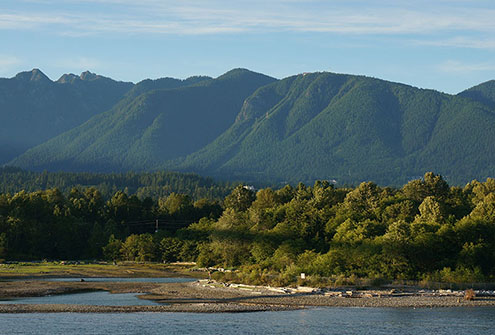
In 1982, Canada amended its Constitution to bring in the Charter of Rights and Freedoms and the protection of Aboriginal rights. Ratcliff lawyer Gary Yabsley was at the table in Ottawa with Indigenous leaders to negotiate the recognition and affirmation of Aboriginal rights in section 35 of the Constitution.
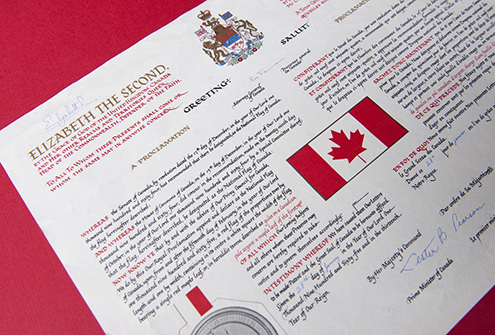
In 1985, Ratcliff lawyer Charles Stein argued the first case in the Supreme Court of Canada to deal with section 7 of the (then) new Charter of Rights and Freedoms. The case, known as Re BC Motor Vehicle Act, was a constitutional reference case brought by the Province of BC. Charles was retained to take the opposing position to that of the BC Government and to advocate for a broad interpretation of this right. Charles’ position carried the day with Canada’s highest court and the decision established the foundational legal and constitutional principles that protect each Canadian’s right to life, liberty and security to this day.
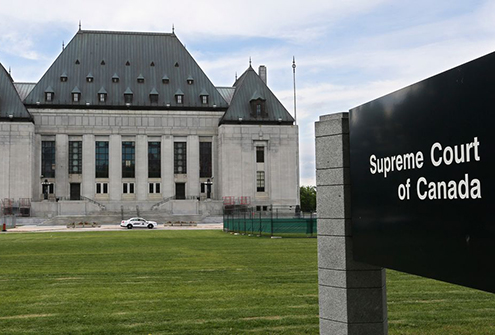
In 1995, Ratcliff merged with the North Vancouver community law firm Collier Hanson to build on the firm’s community, wills and estates, business and real estate practice. Daryl Collier became managing partner of the firm and remained with Ratcliff until his retirement. Brian Hanson remains a partner to this day. This merger solidified Ratcliff as the premier law firm serving the North Shore community.

In 1996, Ratcliff lawyer Harry Slade negotiated the settlement of a claim on behalf of the Blueberry River and Doig First nations regarding the loss of their shared reserve lands that they were compelled to surrender after the Second World War for the use of returning veterans.

As part of the omnibus claim filed in 1977, Squamish sought the return of, or compensation for, the loss of their village of Sen̓áḵw, the Kitsilano Reserve located in Vancouver at present-day Vanier Park. This claim was severed out from the omnibus claim and went to trial in Federal Court for almost three years. Under the direction of Ratcliff’s John Rich as lead counsel, Squamish successfully established the former reserve land was a reserve established for the Squamish Nation and, prior to a final judgment on the issue of liability, settled the case for a substantial amount of compensation. Squamish established a trust with the money that endures to this day and continues to provide financial benefits to Squamish Nation.
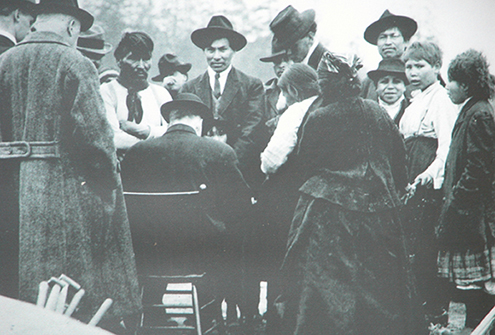
In 1997, Greg McDade QC, a talented and innovative environmental lawyer, and founding director of Ecojustice (formerly Sierra Legal Defense Fund) was invited to join Ratcliff’s litigation team by John Rich. Greg became instrumental in Ratcliff’s Aboriginal, constitutional and environmental litigation practice and very soon became a leader in the firm. He became managing partner in 2000 and over the course of more than two decades led Ratcliff to be the innovative and diverse firm it is today. Though he has handed off the torch of managing partner, he remains with Ratcliff as Senior Counsel and continues to be an integral part of the firm.
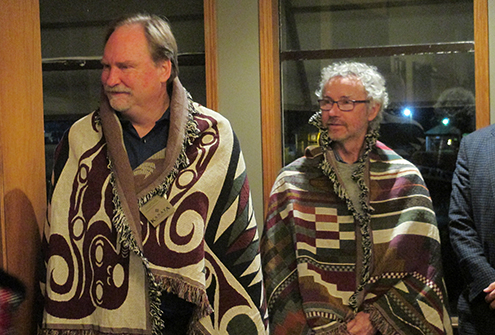
In 1990, the Canadian Pacific Railway attempted to sell former railway land that it had expropriated from the Squamish Kitsilano Reserve in 1886 and 1902. Ratcliff lawyers John Rich, Charles Stein, Matthew Kirchner and Brent Lehmann brought an action against Canadian Pacific Railway and Canada on behalf of Squamish asserting that the CPR had no rights to sell the land once it was no longer needed for the railway. Even though the CPR held a certificate of indefeasible title stating that it held “absolute title” to the land, the Court agreed with Squamish that CPR had no rights to sell or even continue to use this land because it still belonged to Squamish. As a result, 10 acres of the former 80-acre Kitsilano Indian Reserve were returned to Squamish. Squamish is now proposing a revolutionary development for the land that will see hundreds of rental units introduced into Vancouver’s challenging rental market.
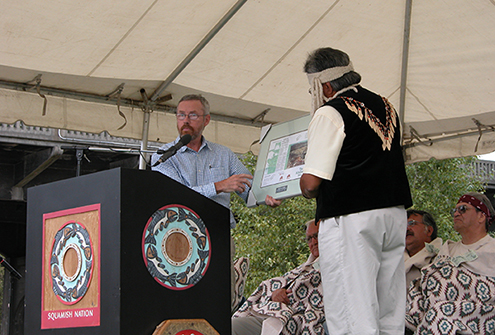
In 2009, after more than 120 days of trial, Ratcliff lawyers John Rich, Matthew Kirchner, Lisa Glowacki, Kevin Lee and Kate Blomfield won a landmark case for five Nuu-chah-nulth First Nations on the West Coast of Vancouver Island establishing Aboriginal rights to fish commercially in their territory. To this day, the Ahousaht case, as it is known, is the only court decision to recognize an Aboriginal right to fish commercially for a broad range of marine resources.
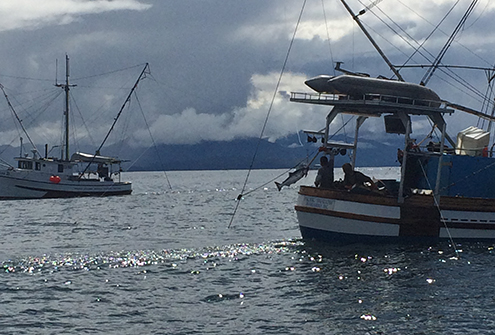
The Maa-nulth First Nations are five Nuu-chah-nulth-speaking Indigenous peoples located on the West Coast of Vancouver Island. The journey to once again become self-governing has been long and difficult. For over 150 years Canada denied any Aboriginal right to self-government. In 1982 with the repatriation of the Canadian Constitution, Aboriginal identity and rights became constitutionally-protected in Canada. Since much of British Columbia is not under treaty, the substance of these now-protected identities and rights required clarification and the BC Treaty Commission was established in 1992. Negotiations between the Maa-nulth, Canada and British Columbia through the BC Treaty Process, with Gary Yabsley as lead negotiator, culminated with ratification of a Final Agreement on April 9, 2009. The Maa-nulth Final Agreement was only the second treaty to be ratified through the BC Treaty Process and was the first multi-nation treaty. On April 1, 2011 the Maa-nulth Final Agreement, in recognition and affirmation of Maa-nulth’s inherent right to self-government, came into effect and since that date Brent Lehmann has been leading the team of Ratcliff lawyers assisting Maa-nulth in exercising and benefiting from their treaty rights.
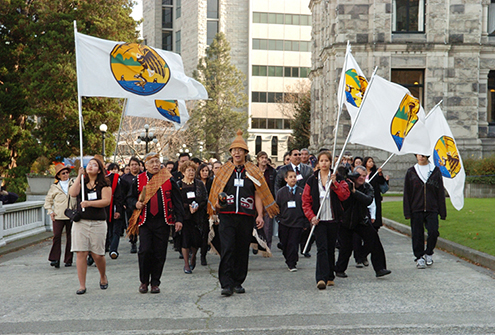
In 2017, Ratcliff lawyers proved that the Government of Canada breached its fiduciary duty to the Coldwater Indian Band when it approved the transfer of the existing Trans Mountain Pipeline easement through Coldwater’s reserve.
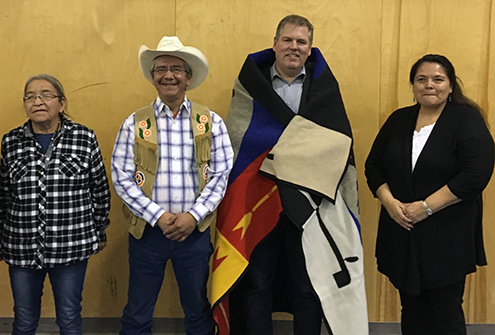
In 2019-2020, a team of Ratcliff lawyers that included Greg McDade QC, Lisa Glowacki and Jamie Arbeau brought to trial a landmark case seeking to prove an infringement of Treaty 8 rights through unchecked oil and gas development and forestry activity in Northeast BC. This is the first case seeking to prove a comprehensive infringement of Treaty 8.
In June 2021, the BC Supreme Court ruled that the cumulative encroachment of Blueberry territory by provincial development projects effectively barred members of the Nation from exercising their rights and amounted to a breach of Treaty 8. The judgment opens up a greater role for First Nations in designing protections and management systems for their lands, and ensures that further public development is consistent with Treaty promises.

In 2019, Ratcliff lawyers Matthew Kirchner, Kevin Lee, Melinda Skeels, Emma Hume and Natalia Sudeyko began a trial in British Columbia’s first private nuisance claim based on Aboriginal Rights and Title. The claim seeks to restore flows and fisheries in the Nechako River that was dammed in the 1950s by the Aluminum Company of Canada (Alcan), which is now owned by the multi-national Rio Tinto Inc.
In January 2022, the British Columbia Supreme Court held that Saik’uz and Stellat’en have a constitutionally-protected Aboriginal right to fish for food, social and ceremonial purposes in the Nechako watershed and that Alcan’s operation of the Kenney Dam has caused significant historic and ongoing harm to the Nechako River and its fisheries.
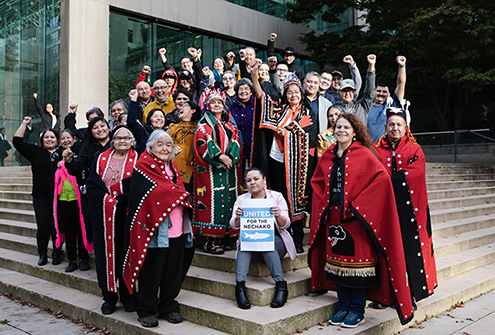

Ratcliff is respected and recognized as one of Canada’s leading law firms practicing Indigenous law and representing First Nations clients.

Ratcliff provides effective, pragmatic legal advice to individuals and businesses, in the areas of business law, wills & estates law, and real estate law.

Ratcliff LLP is a leading law firm in the area of public law, as well as one of Canada’s leading firms in Environmental Law.

BRENT LEHMANN, PARTNER